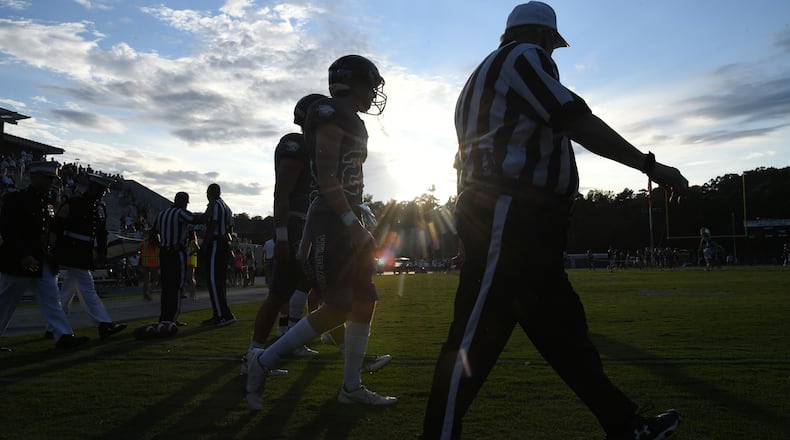GHSA associate director Kevin Giddens has accepted a truth that, at first, he wanted to ignore.
There simply aren’t enough playoff-qualified game officials for all 128 first-round state tournament games to be played on a Friday. So for the second year in a row, first-round playoff games will be split between Nov. 12 and Nov. 13.
It’s a decision that before last year was unprecedented. With the struggle to retain and recruit game officials, it’s expected to become a trend for the foreseeable future.
The games are split based on classification, with classifications rotating each year. Last year, Class 2A and 4A were moved to Saturday — no exceptions. This year, 1A Public and Private and 6A will play Saturday.
Giddens, whose responsibilities include football, made the decision to again split the first round almost immediately following the 2020 season. He sent an email to all GHSA member school administrators and coaches in January announcing the plan.
“I saw the reality of it,” said Giddens, who joined the GHSA staff in 2018. “Sure, we could schedule 128 games for Friday, but there’d be 12 stadiums where everyone showed up and there’d be no officials to call it. So I had to look at ways to make it as equitable as possible for everyone, not fair. Fair is candy and a carnival. ... I made sure every team in the bracket played on the same day so that they had the same amount of recovery time and prep time.”
Last year, Giddens held out as long as he could before making the decision to split the first round, hoping there was a way to make it work. He announced the split on the Monday before the first round, giving the affected teams less than five days to adjust. In retrospect, he deeply regrets that.
As a former state-champion coach and athletic director at Colquitt County High with more than 30 years of experience, he realizes the bind that put programs in.
“That was the hardest thing to do,” he said. “I called the schools that had to move to Saturday, individually. It was tough hearing coaches tell me I’d just thrown a wrench into their game week. So I decided I was never doing that again. So I made the decision as early as I could this year.”
While there has been a nationwide challenge to recruit and retain game officials because of a lack of pay, startup costs and abuse from fans, coaches and players, the tipping point that led to a split first round was the pandemic.
The GHSA saw its number of registered game officials fall from 2,181 in 2019 to 1,797 last year. It has 1,780 this year. Those numbers drop even more when it comes to the playoffs, where only game officials who take additional training are qualified to participate. In addition, the crew for playoff games is increased from the regular season from five game officials to seven.
In 2019, the GHSA had 1,107 playoff qualified game officials. This year, they have 881.
Using non-playoff qualified game officials was an option left on the table.
“The tradeoff is you’re getting each official association’s top crews,” Giddens said.
Spencer Smith, a GHSA official with more than 40 years experience who serves on the organization’s training committee and is head of the Georgia Football Officials Association, sees the declining numbers as a trend that will continue because of a generation gap.
“It seems to be that this generation is not willing to put the time in to becoming a good official,” Smith said. “They come in wanting to be an official the first week. You have to crawl before you walk and walk before you run.”
Despite the downward trending numbers, Smith is confident the quality of officiating remains high in Georgia, where the pay — $95 per regular-season game and $150 in the postseason — is well above the national average of $79 and $95, respectively.
That high quality especially holds true in the playoffs.
“The ones who are (in the playoffs) are the ones who made the commitment to be better and do a good job,” Smith said.
The GHSA, NFHS and others are aggressively recruiting new game officials, visiting college campuses, talking to intramural sports participants, handing out business cards and marketing on social media. Giddens is hopeful those efforts pay off.
“Fingers crossed, we’ll keep growing each year and get back to where we were pre-pandemic,” Giddens said.
About the Author

